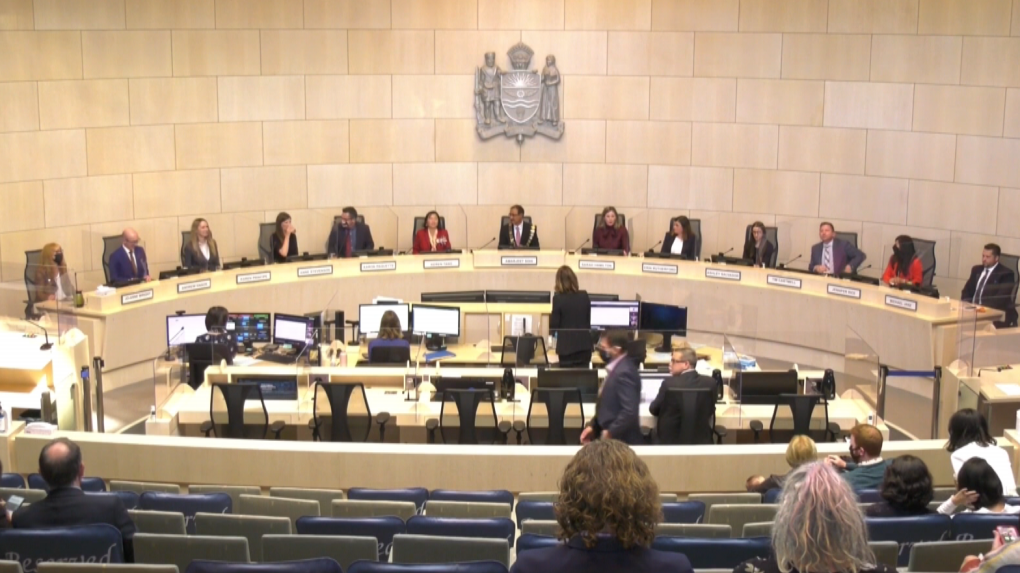
Edmonton City Council in a file photo.
Sean Amato
CTV News Edmonton
Updated April 19, 2022
A motion to decriminalize "simple personal possession" of illegal drugs in the Alberta capital was approved 11-2 by city councillors Tuesday.
The policy of decriminalization is an attempt to "reduce drug poisoning injuries and deaths." In 2021, 624 people in Edmonton died of opioid overdoses and poisonings.
Mayor Amarjeet Sohi voted for the motion. He called decriminalization an "additional tool" to help people suffering from addictions by reducing the stigma and fear they face.
"These are loved ones. These are people who have families. These are people who are Edmontonians like everyone else," Sohi said.
"They deserve dignity, they deserve to live and they deserve the support from the community, but unfortunately that support is lacking because we don't have all the tools."
City staff will prepare a submission to Health Canada for a section 56(1) exemption to the Controlled Drugs and Substances Act. Toronto, Vancouver and British Columbia have all made similar requests, but none have been approved yet.
Edmonton will also lobby the provincial and federal governments for advancements on "safe supply, safe consumption sites, treatment and supportive housing."
Last week, some harm-reduction advocates and medical professionals urged councillors to move forward on decriminalization, and Prime Minister Justin Trudeau said he'd welcome the city's request.
Councillors Jennifer Rice and Karen Principe voted against the part of the motion seeking decriminalization.
"I do have the concern to do this. And specifically from like a jurisdiction authority perspective and also from a legal perspective," Rice said during the meeting. "We do have federal and provincial governments take initiatives to look after this matter."
"I agree with her. I think this is a little bit redundant," Principe said. She also previously expressed concerns about open drug use in public areas and on transit.
City officials have been directed to work with Alberta Health Services, Alberta Health, Edmonton Police Service, public health and medical experts and Indigenous people, among others, to develop the new drug polici
Sean Amato
CTV News Edmonton
Updated April 19, 2022
A motion to decriminalize "simple personal possession" of illegal drugs in the Alberta capital was approved 11-2 by city councillors Tuesday.
The policy of decriminalization is an attempt to "reduce drug poisoning injuries and deaths." In 2021, 624 people in Edmonton died of opioid overdoses and poisonings.
Mayor Amarjeet Sohi voted for the motion. He called decriminalization an "additional tool" to help people suffering from addictions by reducing the stigma and fear they face.
"These are loved ones. These are people who have families. These are people who are Edmontonians like everyone else," Sohi said.
"They deserve dignity, they deserve to live and they deserve the support from the community, but unfortunately that support is lacking because we don't have all the tools."
City staff will prepare a submission to Health Canada for a section 56(1) exemption to the Controlled Drugs and Substances Act. Toronto, Vancouver and British Columbia have all made similar requests, but none have been approved yet.
Edmonton will also lobby the provincial and federal governments for advancements on "safe supply, safe consumption sites, treatment and supportive housing."
Last week, some harm-reduction advocates and medical professionals urged councillors to move forward on decriminalization, and Prime Minister Justin Trudeau said he'd welcome the city's request.
Councillors Jennifer Rice and Karen Principe voted against the part of the motion seeking decriminalization.
"I do have the concern to do this. And specifically from like a jurisdiction authority perspective and also from a legal perspective," Rice said during the meeting. "We do have federal and provincial governments take initiatives to look after this matter."
"I agree with her. I think this is a little bit redundant," Principe said. She also previously expressed concerns about open drug use in public areas and on transit.
City officials have been directed to work with Alberta Health Services, Alberta Health, Edmonton Police Service, public health and medical experts and Indigenous people, among others, to develop the new drug polici
No comments:
Post a Comment